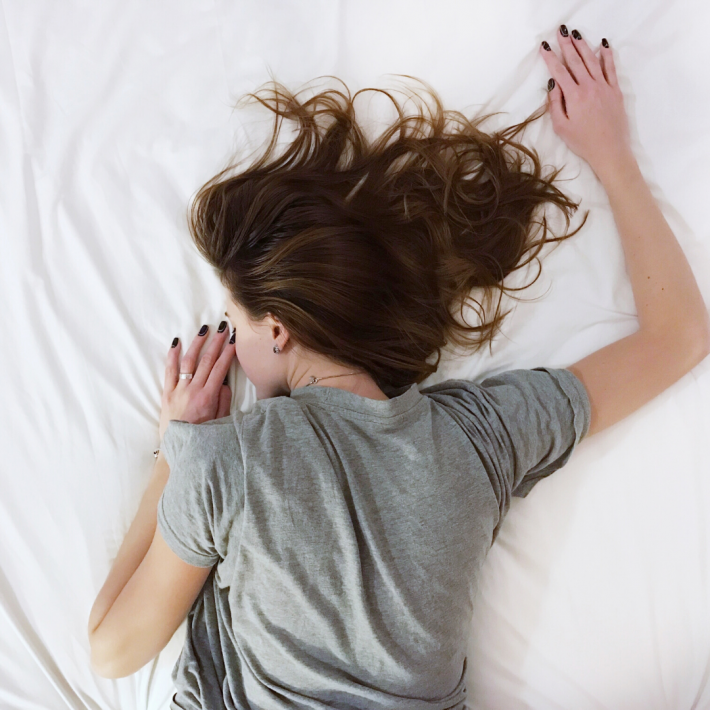Διατροφή & ύπνος

Have you noticed that when you don't get enough sleep you eat more and you find it difficult to lose weight? You are not alone, as research agrees!
Epidemiological studies link reduced sleep duration to obesity. Meta-analyses of the risk of obesity show that both increased and decreased sleep time are associated with an increased risk of obesity, by 4% and 45%, respectively!
Decreased sleep duration is associated with increased food & calorie intake. Increased consumption of 300-550 kcal per day has been observed. At the same time, there is a correlation with higher fat intake, lower fruit intake and low food quality, messy meals and consumption of energy-dense snacks at night. In contrast, increasing sleep duration in people who have short sleep seems to reduce the intake of free sugars, fats and carbohydrates!
A meta-analysis of studies looked at the effect of partial sleep deprivation on energy intake (how many calories we eat) and expenditure (how many calories we burn). While basic metabolic rate and energy expenditure remained unchanged, an increase in energy intake as well as fat intake was observed, with a decrease in protein intake. Other meta-analyses and studies show a trend for a small increase in energy expenditure, which, however, is much smaller than the observed increase in energy intake.
Regarding the effect on weight loss, in people who follow a weight loss program, about 1 hour less sleep, 5 times a week led to less fat loss, while in the long run, weight gain has been associated with sleep lasting <6 or> 8 hours.
Of course, sleep quality also plays a role. The MedWeight study has shown that people with better sleep quality are more likely to maintain their weight loss, while another study has shown that low sleep quality is associated with less fat loss!
What can we do to improve sleep? The answer lies in #sleephygiene.
According to the National Sleep Foundation:
Sleep hygiene is a variety of different practices and habits that are necessary to have good nighttime sleep quality and full daytime alertness.
One of the most important sleep hygiene practices is to spend an appropriate amount of time asleep in bed, not too little or too excessive. Sleep needs vary across ages and are especially impacted by lifestyle and health. However, there are recommendations that can provide guidance on how much sleep you need generally.
Other good sleep hygiene practices include:
- Limiting daytime naps to 30 minutes. Napping does not make up for inadequate nighttime sleep. However, a short nap of 20-30 minutes can help to improve mood, alertness and performance.
- Avoiding stimulants such as caffeine and nicotine close to bedtime. And when it comes to alcohol, moderation is key4. While alcohol is well-known to help you fall asleep faster, too much close to bedtime can disrupt sleep in the second half of the night as the body begins to process the alcohol.
- Exercising to promote good quality sleep. As little as 10 minutes of aerobic exercise, such as walking or cycling, can drastically improve nighttime sleep quality. For the best night’s sleep, most people should avoid strenuous workouts close to bedtime. However, the effect of intense nighttime exercise on sleep differs from person to person, so find out what works best for you.
- Steering clear of food that can be disruptive right before sleep. Heavy or rich foods, fatty or fried meals, spicy dishes, citrus fruits, and carbonated drinks can trigger indigestion for some people. When this occurs close to bedtime, it can lead to painful heartburn that disrupts sleep.
- Ensuring adequate exposure to natural light. This is particularly important for individuals who may not venture outside frequently. Exposure to sunlight during the day, as well as darkness at night, helps to maintain a healthy sleep-wake cycle.
- Establishing a regular relaxing bedtime routine. A regular nightly routine helps the body recognize that it is bedtime. This could include taking warm shower or bath, reading a book, or light stretches. When possible, try to avoid emotionally upsetting conversations and activities before attempting to sleep.
- Making sure that the sleep environment is pleasant. Mattress and pillows should be comfortable. The bedroom should be cool – between 60 and 67 degrees – for optimal sleep. Bright light from lamps, cell phone and TV screens can make it difficult to fall asleep4, so turn those light off or adjust them when possible. Consider using blackout curtains, eye shades, ear plugs, "white noise" machines, humidifiers, fans and other devices that can make the bedroom more relaxing.
Resources/Bibliography
- Sleep–obesity relation: underlying mechanisms and consequences for treatment
- A Systematic Review and Meta-Analysis of Randomized Controlled Trials of the Impact of Sleep Duration on Adiposity and Components of Energy Balance
- Influence of sleep restriction on weight loss outcomes associated with caloric restriction
- Sleep quality is associated with weight loss maintenance status: the MedWeight study
- Changes in Diet and Lifestyle and Long-Term Weight Gain in Women and Men
- Insufficient sleep undermines dietary efforts to reduce adiposity.
- Short Sleep Duration and Dietary Intake: Epidemiologic Evidence, Mechanisms, and Health Implications
- The Effects of Partial Sleep Deprivation on Energy Balance: A Systematic Review and Meta-Analysis.
- Sleep duration and obesity among adults: a meta-analysis of prospective studies.
- Long sleep duration predicts a higher risk of obesity in adults: a meta-analysis of prospective cohort studies.
- Sleep extension is a feasible lifestyle intervention in free-living adults who are habitually short sleepers: a potential strategy for decreasing intake of free sugars? A randomized controlled pilot study
Ποιο είναι το πιο υγιεινό ψωμί;

Το ψωμί είναι βασική πηγή υδατανθράκων στη χώρα μας, και βρίσκεται στη βάση του προτύπου της Μεσογειακής Διατροφής. Είναι όμως όλα τα είδη ψωμιού τα ίδια; Ποιο είναι η καλύτερη επιλογή σε ψωμί που μπορούμε να κάνουμε;
Καταρχάς, ας δούμε τι είδους ψωμιά υπάρχουν στη διάθεση μας. Υπάρχουν ψωμιά του εμπορίου, όπως το ψωμί του τοστ που θα πάρουμε από το σουπερμάρκετ, πληθώρα ειδών ψωμιού στο φούρνο, όπως η τσιαπάτα, η μπαγκέτα, το χωριάτικο-ζυμωτό ψωμί, το ψωμί από προζύμι, ψωμί ολικής άλεσης, ψωμί πολύσπορο, ψωμί χωρίς ζάχαρη ή/και αλάτι, γερμανικού τύπου ψωμί, και άλλα πολλά! Φυσικά μπορούμε να φτιάξουμε και το δικό μας!
Τι να προσέξουμε για να επιλέξουμε το πιο ποιοτικό ψωμί για τη διατροφή μας;
Ψωμί από αλεύρι ολικής άλεσης ή Πολύσπορο ψωμί από αλεύρι ολικής άλεσης
Το πλέον βασικό σημείο στην επιλογή ψωμιού είναι να επιλέξουμε ψωμί που έχει γίνει με αλεύρι ολικής άλεσης. Το ψωμί “από αλεύρι ολικής άλεσης” είναι διαφορετικό από το “ψωμί με αλεύρι ολικής άλεσης”, καθώς στο ψωμί ολικής άλεσης έχουν χρησιμοποιεί μόνο άλευρα ολικής άλεσης. Το ψωμί ολικής άλεσης είναι πιο θρεπτικό από το ψωμί που έχει γίνει με λευκό αλεύρι, και είναι πιο πλούσιο σε Κάλιο, Φώσφορο, Μαγνήσιο και Ψευδάργυρο, ενώ χάρη στις φυτικές του ίνες είναι πιο χορταστικό και έχει οφέλη στην ρύθμιση του σακχάρου και των λιπιδίων του αίματος, όπως και στην καλύτερη λειτουργία του πεπτικού, και την υγεία της εντερικής μικροχλωρίδας και των λειτουργιών της.
Το σκούρο χρώμα δεν είναι απόδειξη ότι το προϊόν είναι ολικής άλεσης. Επίσης, το γεγονός ότι το ψωμί είναι πολύσπορο δεν σημαίνει απαραιτήτως ότι είναι και ολικής άλεσης! Βέβαια, στην περίπτωση του ψωμιού ολικής άλεσης πολύσπορου, η θρεπτική αξία είναι ακόμη μεγαλύτερη.
Είναι σημαντικό να σημειωθεί ότι δεν έχει ιδιαίτερη σημασία η προέλευση του άλευρου για το αν είναι ολικής άλεσης ή όχι το ψωμί. Είναι σημαντικό να παρατηρούμε στην ετικέτα του τροφίμου ή να ρωτάμε στον φούρνο αν το αλεύρι ή τα άλευρα που έχουν χρησιμοποιηθεί στο ψωμί είναι ολικής άλεσης, ανεξαρτήτως προέλευσης του σιτηρού. Για παράδειγμα, το ψωμί από σίκαλη δεν είναι απαραιτήτως ολικής άλεσης, ενώ οι διαφορές στην θρεπτική αξία μεταξύ των διάφορων αλεύρων ολικής άλεσης είναι μικρή.
Ψωμί από βρώμη ή ψωμί ολικής άλεσης με βρώμη
Λόγω της επίδρασης στην υγεία της βρώμης, το ψωμί από βρώμη ή ψωμί ολικής άλεσης με βρώμη είναι μια καλή επιλογή ιδιαίτερα για άτομα με υψηλή χοληστερόλη, καθώς η βρώμη έχει ισχυρισμό υγείας για την ρύθμιση της χοληστερόλης, ενώ βοηθά στη ρύθμιση του σακχάρου στο αίμα, καθώς και και στον καλύτερο κορεσμό, χάρη στις φυτικές ίνες.
Επιλέγουμε ψωμί από 100% βρώμη ή στην περίπτωση που το ψωμί βρώμης παρέχει και άλλα άλευρα, ιδανικά επιλέγουμε εκείνο που περιέχει βρώμη και άλευρα ολικής άλεσης.
Ψωμί από προζύμι
Το ψωμί από προζύμι είναι μια εξαιρετική επιλογή ψωμιού, ειδικά εάν φτιάχνουμε εμείς το ψωμί. Για το ψωμί από προζύμι δεν χρησιμοποιείται μαγιά, αλλά “φουσκώνει” λόγω των οξυγαλακτικών βακτηρίων που υπάρχουν ήδη στο (λευκό ή ολικής άλεσης) αλεύρι. Το προζύμι γίνεται όταν γίνεται ζύμωση των βακτηρίων αυτών σε μίγμα από αλεύρι και νερό. Η αρχική διαδικασία παίρνει ημέρες. Το ψωμί από προζύμι είναι ιδιαίτερα θρεπτικό, ειδικά όταν είναι από αλεύρι ολικής άλεσης, ενώ χάρη στη ζύμωση τα θρεπτικά συστατικά είναι πιο βιοδιαθέσιμα, λόγω μείωσης του φυτικού οξέος, έχει χαμηλότερο γλυκαιμικό δείκτη, ενώ είναι και πιο εύπεπτο για άτομα με Σύνδρομο Ευερέθιστου Εντέρου, καθώς είναι χαμηλότερο σε FODMAPs. Τέλος, το ψωμί με προζύμι είναι και πηγή πρεβιοτικών ινών που αποτελούν υπόστρωμα (τροφή) για τα ωφέλιμα βακτήρια της μικροχλωρίδας του εντέρου.
Είναι σημαντικό να αναφερθεί το γεγονός ότι δεν είναι όλα τα ψωμιά του εμπορίου με προζύμι φτιαγμένα με την αυθεντική συνταγή, και αυτό είναι εμφανές και στα οργανοληπτικά χαρακτηριστικά του ψωμιού.
Ψωμί από πλήρη σίκαλη
Το ψωμί από πλήρη σίκαλη είναι το ψωμί που ονομάζουμε γερμανικό ψωμί ή σκανδιναβικό ψωμί ή rye bread και pumpernickel bread, και παρασκευάζεται από πλήρη σίκαλη, συχνά περιέχει σπόρους και είναι αρκετά συμπαγές. Είναι ιδιαίτερα θρεπτικό, πλούσιο σε βιταμίνες του συμπλέγματος Β, και χορταστικό χάρη στην υψηλή περιεκτικότητα του σε φυτικές ίνες. Βέβαια, χρειάζεται να διαβάσουμε τα συστατικά του ψωμιού που επιλέγουμε, καθώς ορισμένα ψωμιά πλήρης σίκαλης περιέχουν μελάσσα ή ζάχαρη για καλύτερη γεύση.
Συνοψίζοντας είναι σημαντικό να επιλέξουμε ένα ψωμί από σιτηρά ολικής άλεσης, ειδικά αν περιέχουν σπόρους. Αναφορικά με την περιεκτικότητα σε ζάχαρη και αλάτι, υπάρχει πληθώρα προϊόντων στο εμπόριο, επομένως είναι σημαντικό να διαβάσουμε τα συστατικά για να δούμε εάν έχει προστεθεί ζάχαρη ή αλάτι, και μπορούμε να συγκρίνουμε διάφορα είδη ψωμιών, και φυσικά να ρωτήσουμε τον φούρνο απ΄όπου προμηθευόμαστε το ψωμί αν έχουν χωρίς ζάχαρη ή/και με λιγότερο αλάτι. Θα θέλαμε το ψωμί που επιλέγουμε να περιέχει πάνω από 3 γραμμάρια φυτικών ινών ανά ανά μερίδα, να μην περιέχει πρόσθετη ζάχαρη, και να έχει λιγότερο αλάτι.
Να φάω ξηρούς καρπούς;

Οι ξηροί καρποί είναι από τις πιο θρεπτικές τροφές. Αν και η περιεκτικόκτητα σε θρεπτικά συστατικά των ξηρών καρπών διαφέρουν ανά καρπό περιέχουν μονοακόρεστα και πολυακόρεστα “καλά” λιπαρά, φυτικές ίνες και πρωτεΐνες, βιταμίνες και μέταλλα, καθώς και δραστικές ουσίες, όπως φυτοχημικά με αντιοξειδωτική και αντιφλεγμονώδη δράση! Στο θρεπτικό προφίλ των ξηρών καρπών οφείλεται η σχέση της τακτικής κατανάλωσης των ξηρών καρπών με την πρόληψη καρκίνου και καρδιαγγειακών νοσημάτων, τα μειωμένα επίπεδα LDL “κακής” χοληστερόλης και ολικής χοληστερόλης, ενώ όταν καταναλώνονται με μέτρο δεν οδηγούν σε αύξηση του βάρους!
Οι ξηροί καρποί αποτελούν ιδανικό σνακ, σε συνδυασμό με κάποιο φρούτο, αλλά μπορούν να προστεθούν σε σαλάτες, στα δημητριακά, στο χυλό βρώμης (porridge), se smoothies, κέικ και σπιτικές μπάρες δημητριακών. Επίσης, στο εμπόριο θα βρείτε φυστικοβούτυρο, αμυγδαλοβούτυρο και άλλα βούτυρα ξηρών καρπών, ενώ μπορείτε να τα φτιάξετε και μόνοι σας! Δώστε προσοχή στα συστατικά και επιλέξτε το προϊόν που περιέχει μόνο τον ξηρό καρπό (100% φυστίκια).
Μεταξύ άλλων θρεπτικών συστατικών οι ξηροί καρποί αποτελούν και πηγές μαγνησίου, μαγγανίου, χαλκού, φωσφόρου, ψευδαργύρου, ασβεστίου και ω-3 λιπαρών οξέων (α-λινολενικού οξέος - ALA), θρεπτικά συστατικά που είναι απαραίτητα για το σώμα μας.
Από τα παραπάνω θρεπτικά συστατικά, τα ω-3 λιπαρά οξέα τα βρίσκουμε κυρίως στα λιπαρά ψάρια, και πολλοί είναι εκείνοι που δεν τρώνε συχνά ψάρια, με αποτέλεσμα να έχουν χαμηλή πρόσληψη των απαραίτητων αυτών λιπαρών. Με καθημερινή κατανάλωση ξηρών καρπών μπροούμε, λοιπόν, να αυξήσουμε την πρόσληψη α-λινολενικού οξέος.
Οι ξηροί καρποί με τη μεγαλύτερη ποσότητα ω-3 λιπαρών οξέων (ALA) ανά 100 γρ είναι οι σπόροι chia, ο λιναρόσπροος, οι σπόροι κάνναβης, τα καρύδια, οι κολοκυθόσποροι, και φυστίκια τύπου Αιγίνης.
Τους ξηρούς καρπούς και τα μίγματα αυτών μπορούμε να τα χρησιμοποιήσουμε ως σνακ ή να το προσθέσουμε σε συνταγές, όπως:
- Chia seed pudding που γίνεται πανεύκολα, και γρήγορα
- ως συστατικά σε δικό μας μίγμα για μούσλι
- πάνω από τον χυλό βρώμης ή μαζί με τα δημητριακά μας
- ως συστατικό σε σπιτικό πολύσπορο ψωμί, σπιτικά κράκερ, μπισκότα και κέικ
- πάνω από το ταχίνι με μέλι ή το φυστικο- και αμυγδαλο- βούτυρο
- ως έχουν σαν σνακ φτιάχνοντας το δικό μας mix ξηρών καρπών, σπόρων και αποξηραμένων φρούτων
Οι ξηροί καρποί είναι μέρος και της Μεσογειακής Διατροφής, και αποτελούν ιδανικό θρεπτικό σνακ και συμπλήρωμα της διατροφής μας για πρόσληψη πληθώρας θρεπτικών συστατικών και αντιοξειδωτικών φυτοχημικών. Μάλιστα, μας είναι ιδιαίτερα χρήσιμοι και σε περιόδους νηστείας, όπου πολλές πηγές πρωτεϊνών και ψαριού, και ακόρεστων λιπαρών (ελαιόλαδο) λείπουν από τη διατροφή μας!
Ανορθόδοξες Δίαιτες Μέρος Θ' (The Pioppi Diet)

H Pioppi diet είναι μια παράδοξη δίαιτα που συγκαταλέγεται στις χειρότερες δίαιτες του 2018 από τον Βρετανικό Σύλλογο Διαιτολόγων. Η δίαιτα παίρνει το όνομά της από το παραθαλλάσιο Ιταλικό χωριό Pioppi, το οποίο έχει συνδεθεί με τη Μεσογειακή Διατροφή, αφού η UNESCO το θεωρεί σπίτι της Μεσογειακής Διατροφής και είναι η περιοχή που διέμενε ο Ancel Keys για 28 χρόνια, καθώς μελετούσε τη Μεσογειακή Διατροφή.
Τι δουλειά, όμως, έχει μια ανορθόδοξη δίαιτα με το σπίτι της Μεσογειακής Διατροφής; Όπως φαίνεται καμία!
Ένας καρδιολόγος και ένας παραγωγός πήγαν να δουν πώς η διατροφή παίζει ρόλο στην μακροζωία των κατοίκων της περιοχής (και απέτυχαν παταγωδώς!). Αν και υποτίθεται οτι οι δυο άνδρες πήγαν να ερευνήσουν τον τρόπο με τον οποίο διατρέφονται οι κάτοικοι, φαίνεται να μην κατάλαβαν σχεδόν τίποτε από τη διατροφή τους.
Στο φτωχό αυτό χωριό, οι κάτοικοι ακολουθούν την κλασσική Μεσογειακή Διατροφή, η οποία χαρακτηρίζεται από την υψηλή κατανάλωση ψαριού, οσπρίων, φρούτων και λαχανικών, ελαιόλαδου, και φυσικά ζυμαρικών! Επίσης, οι κάτοικοι ασχολούνται με χειρονακτική εργασία!
Τι λέει όμως η δίαιτα Pioppi; Αυτή η δίαιτα είναι μια δίαιτα χαμηλή σε υδατάνθρακες και υψηλή σε λίπος, στοιχεία που δε συνάδουν με τη Μεοσγειακή Διατροφή. Η δίαιτα ναι μεν συστήνει την κατανάλωση ποικιλίας φρούτων, ξηρών καρπών, οσπρίων, ψαριού, αλλά απαγορεύει την κατανάλωση κόκκινου κρέατος, γλυκών και αμυλούχων τροφίμων όπως τα ζυμαρικά, ενώ περιέχει λάδι καρύδας το οποίο φυσικά δεν έχει καμία σχέση με τη Μεσογειακή Διατροφή, ούτε βρίσκεται και στην γνωστή σε όλους μας Πυραμίδα της Μεσογειακής Διατροφής!
Αν και η δίαιτα περιέχει τα φρούτα και τα λαχανικά, το ψάρι, το ελαιόλαδο, τη μέτρια κατανάλωση αλκοόλ και την τακτική άκσηση, ξεχνά τα κλασσικά ιταλικά πιάτα με ζυμαρικά, ρύζι και ψωμί, αλλά περιέχει την καρύδα, που φυσικά δεν αποτελεί ιταλικό προϊόν, ενώ οι φτωχοί κάτοικοι έχουν ελαιόλαδο σε εξαιρετική τιμή, και δεν είναι σε θέση να σπαταλούν χρήματα για το -χωρίς λόγο πανάκριβο- λάδι καρύδας!
Επιπλέον, οι συνταγές που προτείνουν δεν έχουν καμία σχέση με την κλασσική ιταλική και Μεσογειακή κουζίνα. Οι συγγραφείς της Δίαιτας Pioppi, προφανώς θέλουν να βαπτίσουν τη δίαιτα που εμπνέυστηκαν ως Μεσογειακή, για διαφημιστικούς λόγους, αλλά επιπλέον προτείνουν και δυνητικά επικίνδυνες τακτικές, όπως την πλήρη νηστεία για 24 ώρες κάθε εβδομάδα, ή την κατανάλωση ξυδιού με άδειο στομάχι!
Η δίαιτα αυτή, λοιπόν, δεν έχει καμία σχέση με τη Μεοσγειακή διατροφή, η οποία είναι πλούσια σε ακόρεστα λιπαρά, σε αντίθεση με τις πλούσιες σε κορεσμένα λιπαρά συνταγές που δίνουν οι συγγραφείς, ενώ η νηστεία που προτείνουν βοηθά στην απώλεια βάρους απλά και μόνο λόγω της έλλειψης τροφής για 24 ώρες!
Συνεπώς, βασιζόμενοι πάνω στη Μεσογειακή Διατροφή κάποιοι προσπαθούν να πουλήσουν τη δική τους “μαγική” δίαιτα, χωρίς επιστημονική τεκμηρίωση, και με επικίνδυνες συστάσεις. Δεκαετίες έρευνας επιβεβαιώνουν τη θετική επίδραση της Μεσογειακής Διατροφής στην υγεία μας, και πάνω σε αυτές διαμορφώνονται και οι συστάσεις διατροφής ανά τον κόσμο. Και ας μην ξεχνάμε ότι ο πατέρας της Μεσογειακής Διατροφής, Ancel Keys έζησε για 100 χρόνια, ακολουθώντας την διατροφή που πρώτος ανέδειξε!





